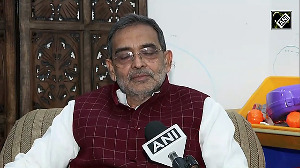1987 - Australia beat England by seven runs
Background: India and Pakistan, determined in a rare display of unity to move the power base of world cricket away from London and Sydney, combined in a successful bid to stage the 1987 cup.
To the chagrin of their supporters both national teams succumbed at the semi-final stage to the traditional powers England and Australia.
Eden Gardens in Calcutta was still packed with 90,000 people and the atmosphere was electric when England captain Mike Gatting and his Australian counterpart Allan Border walked out for the toss.
Key moment - Gatting reverse sweep
Repeatedly utilising the orthodox sweep, Gatting and Graham Gooch had batted England to victory against the Indian spinners in the semi-finals.
In the final Gatting was again well set when Border, an occasional left-armer, decided to try his luck. He speared the ball wide of the leg stump and Gatting, already in position for the reverse sweep, top-edged the ball to jubilant wicketkeeper Greg Dyer.
The reverse sweep had been introduced into one-day matches during the 1970s by Pakistani Mushtaq Mohammad and proved a perfectly legitimate variation.
But it is a premeditated shot, with the batsman needing to adjust his hands before the ball is bowled, and carries a high degree of risk. Most observers thought the risk outweighed the potential benefit at that stage of the match and Border regarded Gatting's dismissal for 41 as the turning point.
Consequences:
The two captains took different paths after the World Cup. Border was now well on the way to assembling a team with the character to put Australian cricket on top again after some dark years. Two years later he regained the Ashes in England and Australia have retained them ever since.
Gatting, who had led England to an Ashes triumph earlier in the year, was sacked as captain in 1988, led the final rebel tour to South Africa in the following year and thereafter played a peripheral role in Test cricket.
1992 - Pakistan beat England by 22 runs
Background:
Pakistan had stumbled in the early stages but, exhorted by captain Imran Khan to fight like cornered tigers, recovered their form at the right moment.
England, now under Gooch who had already been on the losing side in two finals, were a solid, professional outfit and poised to take the final step at the Melbourne Cricket Ground.
Key moment - Imran and Miandad combine.
Imran, the greatest all-rounder of his era, was now in his 40th year and troubled by a shoulder injury. He was reduced to medium pace, but was still a fine bowler. His batting, though, had become his strong suit.
A classical striker of the ball, Imran had the concentration and patience to bat on merit at number three. Miandad, the master improviser and a constant irritant to this opponents, had played in each of the previous four World Cups.
In his final appearance for Pakistan, Imran scored 72, combining with Miandad (58) in a perfectly paced third-wicket partnership of 139, which set up his team for a late assault and a total beyond England's reach.
Consequences:
The patrician Imran and the volatile hustler Miandad were the two greatest cricketers to represent Pakistan.
Imran retired after the World Cup to enter politics, but Miandad was still playing four years later in a record sixth Cup.
1996 - Sri Lanka beat Australia by seven wickets.
Background:
Australia under Mark Taylor had toppled West Indies in the previous year to assume the title of unofficial world champions. Sri Lanka had lost an acrimonious Test series in Australia but in the World Series one-day competition had shown they could successfully chase any total.
The Sri Lankans had always possessed abundant batting ability and now they unveiled a left-hander in Sanath Jayasuriya who did not bother with the formality of playing himself in, but simply assaulted the bowling from the opening over.
Tensions were also high between the sides after Australia forfeited their opening match in Colombo because of a bomb blast.
Key moment - De Silva hit match-winning century
Aravinda de Silva was a true product of the modern era where players switch effortlessly between Test and one-day cricket. All of his attributes were on display after Sri Lanka set off in chase of Australia's total of 241.
After Jayasuriya was run out for nine, De Silva stroked his way to an unbeaten 107 off 124 balls with 13 fours and no undue risks to help Sri Lanka win with 22 balls to spare.
Consequences:
Under Taylor's successor Steve Waugh, Australia began to take one-day cricket as seriously as the five-day game. Sri Lanka became a formidable force at home in both forms of cricket and, after beating England in a one-off Test at the Oval in 1998 were finally granted a series at the home of cricket in 2002.
1999 - Australia beat Pakistan by eight wickets
Background:
After an indifferent start in a chilly English spring, Waugh's Australians needed to win seven games in succession to take their second World Cup. The impossible became the probable after Waugh's epic unbeaten 120 ensured victory in a group match against South Africa followed by a dramatic tie in the semi-final against the same opponents, sufficient for a place in the final against the unpredictable Pakistanis.
Key moment:
To put it kindly, Inzamam-ul-Haq is an erratic runner between the wickets. But he is a glorious striker of the ball who played an important part in the 1992 semi-finals and final and can punish any attack.
Pakistan were already in trouble when Inzamam came to the crease. He played cautiously against the Australian attack, in which Glenn McGrath and Shane Warne excelled, reaching 15 before a ball from Paul Reiffel clipped his pad and was caught by Adam Gilchrist.
"The Australians went up in appeal; umpire Shepherd's finger in judgment," Wisden recorded. "An incredulous Inzamam plodded off at funereal pace."
Pakistan succumbed tamely and Australia went on to win an embarrassingly one-sided match.
Consequences:
The tournament proved the making of Waugh as a captain. Under his increasingly inspired leadership Australia went on to win a record 16 Tests in a row and at the turn of the century some judges rated his team as the best in history.






